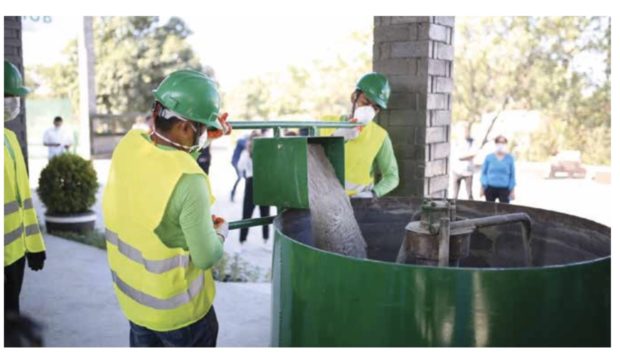
Plastic waste is mixed with cement to produce construction materials like eco-bricks at ALI’s eco-hub in Arca South
Property giant Ayala Land Inc. (ALI) has invested in the first two of what could be a string of processing plants or “ecohubs” that convert plastic waste collected from the group’s various real estate and construction projects into raw materials for bricks and other building materials.
The first ecohub opened in March last year at ALI’s Arca South estate in Taguig. The second one opened at its Lio ecotourism estate in Palawan in the last quarter of 2019.
Since their opening, the ecohubs have so far collected a total of 42 tons of plastic waste and produced a total of 139,000 products.
These ecohubs are meant to “demonstrate a circular economy model for Ayala Land, using and processing clean and dry plastic discards,” ALI vice president Manny Blas told Inquirer.
“Our objective is to treat waste, particularly plastics, as a resource to primarily keep them from ending up in landfills and oceans. Clean and dry plastic wastes are collected from Ayala Land projects and turned into materials—ecobricks, ecocasts, ecopavers—that can be used in construction,” Blas said.
Each of the waste processing plants has the capacity to process around 30 tons of plastic waste annually. Together, they can produce a maximum of 430,000 products, consisting of 186,000 ecobricks, 94,000 ecopavers and 150,000 ecocasts each year.
“To illustrate, 186,000 ecobricks is equivalent to 2.3 kilometers of perimeter wall, at two meters high, almost equivalent to the length of Ayala Avenue from Edsa to Ayala North Exchange,” Blas said.
The plastic waste used by Arca South comes from select ALI malls and offices, Makati Development Corp.’s construction sites, institutional contributors and the public, through drop-off points.
The new ecohub at Lio processes plastic waste from Lio, all four El Nido resorts and nearby communities. Asked if more ecohubs would be built, Blas said: “As waste management is a priority sustainability project for ALI, we will consider opening new ecohubs as demand for our ecoproducts increase.”—DORIS DUMLAO-ABADILLA INQ